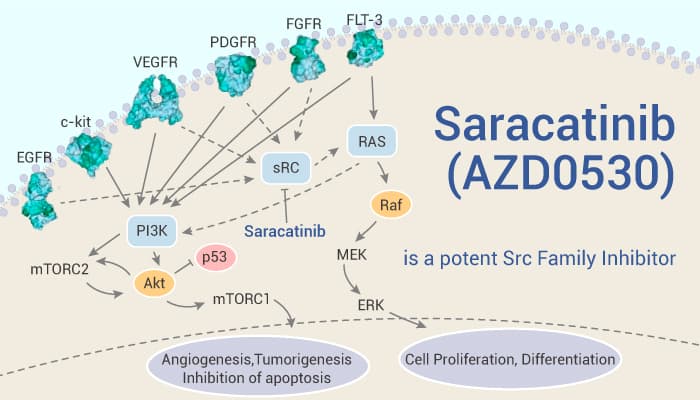Src is a prototypical non-receptor tyrosine kinase. It also includes c-Yes and Fyn. Src transduces signals that control processes involved in cell proliferation, adhesion, and motility. Clinical evidence supports a link between deregulation of Src activity and tumor progression and metastasis. Src over-expression and activation are associated with numerous types of cancers. Increasing evidence connects Src activity to prostate carcinogenesis. In this study, Saracatinib (AZD0530) is a potent Src family inhibitor with IC50s of 2.7 to 11 nM for c-Src, Lck, c-YES, Lyn, Fyn, Fgr, and Blk. It also shows high selectivity over other tyrosine kinases.
Saracatinib, a potent, orally available Src inhibitor, shows antitumor activities.

Saracatinib is an orally available Src inhibitor. It demonstrates potent anti-migratory and anti-invasive effects in vitro. It also inhibits metastasis in a murine model of bladder cancer. Antiproliferative activity of Saracatinib varies between cell lines (IC50 of 0.2-10 μM). Moreover, it potently inhibits the proliferation of Src3T3 mouse fibroblasts. This demonstrates variable antiproliferative activity in a range of human cancer cell lines containing endogenous Src. In addition, sub-micromolar growth inhibition of five of the human cancer cell lines tested with Saracatinib is observed with IC50 values of 0.2-0.7 μM. In 3-day MTS cell proliferation assays, Saracatinib inhibits proliferation of the Bcr-Abl-driven human leukemia cell line K562 with an IC50 of 0.22 μM. Furthermore, Saracatinib reduces the migration of human lung cancer A549 cells in a concentration-dependent manner.
Saracatinib potently inhibits the proliferation of subcutaneously transplanted Src3T3 fibroblasts in mice and rats in a dose-dependent manner. In both models, Saracatinib (doses ≥6 mg/kg/day) shows significant inhibition of tumor growth. Moreover, at the maximum doses investigated, Saracatinib completes tumor growth inhibition (100% inhibition at 25 mg/kg/day in mice and 10 mg/kg/day in rats).
In summary, AZD0530, an orally available Src inhibitor, has potent anti-migratory and anti-invasive effects and inhibits metastasis in a murine model of bladder cancer.
Reference:
Green TP, et al. Mol Oncol, 2009, 3(3), 248-261.